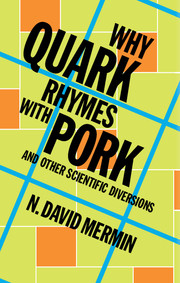Book contents
- Frontmatter
- Dedication
- Contents
- Preface
- Part One Reference Frame Columns, Physics Today 1988–2009
- Part Two Shedding Bad Habits
- Part Three More from Professor Mozart
- 34 What's wrong with this book, unpublished, 1992
- 35 What's wrong with these stanzas, Physics Today, July 2007
- Part Four More to be Said
- Part Five Some People I've Known
- Part Six Summing it Up
- Index
35 - What's wrong with these stanzas, Physics Today, July 2007
from Part Three - More from Professor Mozart
Published online by Cambridge University Press: 05 January 2016
- Frontmatter
- Dedication
- Contents
- Preface
- Part One Reference Frame Columns, Physics Today 1988–2009
- Part Two Shedding Bad Habits
- Part Three More from Professor Mozart
- 34 What's wrong with this book, unpublished, 1992
- 35 What's wrong with these stanzas, Physics Today, July 2007
- Part Four More to be Said
- Part Five Some People I've Known
- Part Six Summing it Up
- Index
Summary
Longtime readers of Reference Frame may remember my opinionated, cigar-smoking friend Professor Mozart, who last appeared in Physics Today in August 1999, having dropped in on me after seven years of retirement on a small tobacco plantation in Connecticut. Another eight years having passed, there he was again, at my office door. “W. A.!” I shouted with surprise and delight. “How's the tobacco business?”
“Left it,” he growled. “Taken the pledge.” And indeed, he gave off no smoky aroma. “Bought a vineyard. Napa Valley. Took up poetry. Thirty-third anniversary of the November revolution of 1974. Third of a century. Time to celebrate with commemorative verses.” He sighed. “Brought the project to the attention of the Poet Laureate. Doesn't know enough physics. So,” he added in a business-like tone of voice, “I did it myself.” And before I could say another word of welcome, he declaimed:
I have always found it risible
That “atom” should mean indivisible,
When deep inside all atoms lie
Their very tiny nuclei,
Containing almost all the mass,
Surrounded by a foggy gas:
Electrons! We should all be proud
Of what we know about that cloud,
Whose properties were once a mystery
But now belong to science history:
An explanation full and blemish-free
That underlies the whole of chemistry.
And yet the story's even richer.
Within the nucleus we picture
Nucleons—still smaller particles,
About which I could write whole articles.
But let it here suffice to say
The two varieties that they
Possess. (1) Protons with a charge
Of electricity just large
Enough to hold electrons in
Those clouds in which they whirl and spin.
(2) Neutrons: uncharged partners of
The protons, held to them as love
Binds lovers in their warm embrace,
Though bound by mesons in this case.
What could be to God's greater glory?
And yet there's much more to the story!
The nucleons themselves have pieces
Described in many a doctor's thesis.
The Standard Model is the name
Of this subnucleonic game.
It underlies the interplay
Of everything. And so, I say:
Enough of idle talk and twaddle –
Let's celebrate the Standard Model!
At this he took a deep bow. “Very nice, Bill,” I said politely, “but don't you think 18 unrelieved couplets get a bit bumpy?”
“The uniformity is relieved by the random variation of 8 feminine (twaddle-model, glory-story, …) and 10 masculine (name-game, charge-large, …) rhymes.
- Type
- Chapter
- Information
- Why Quark Rhymes with PorkAnd Other Scientific Diversions, pp. 257 - 266Publisher: Cambridge University PressPrint publication year: 2016



